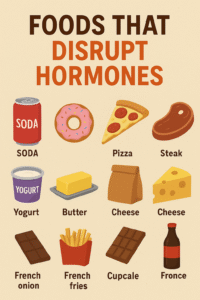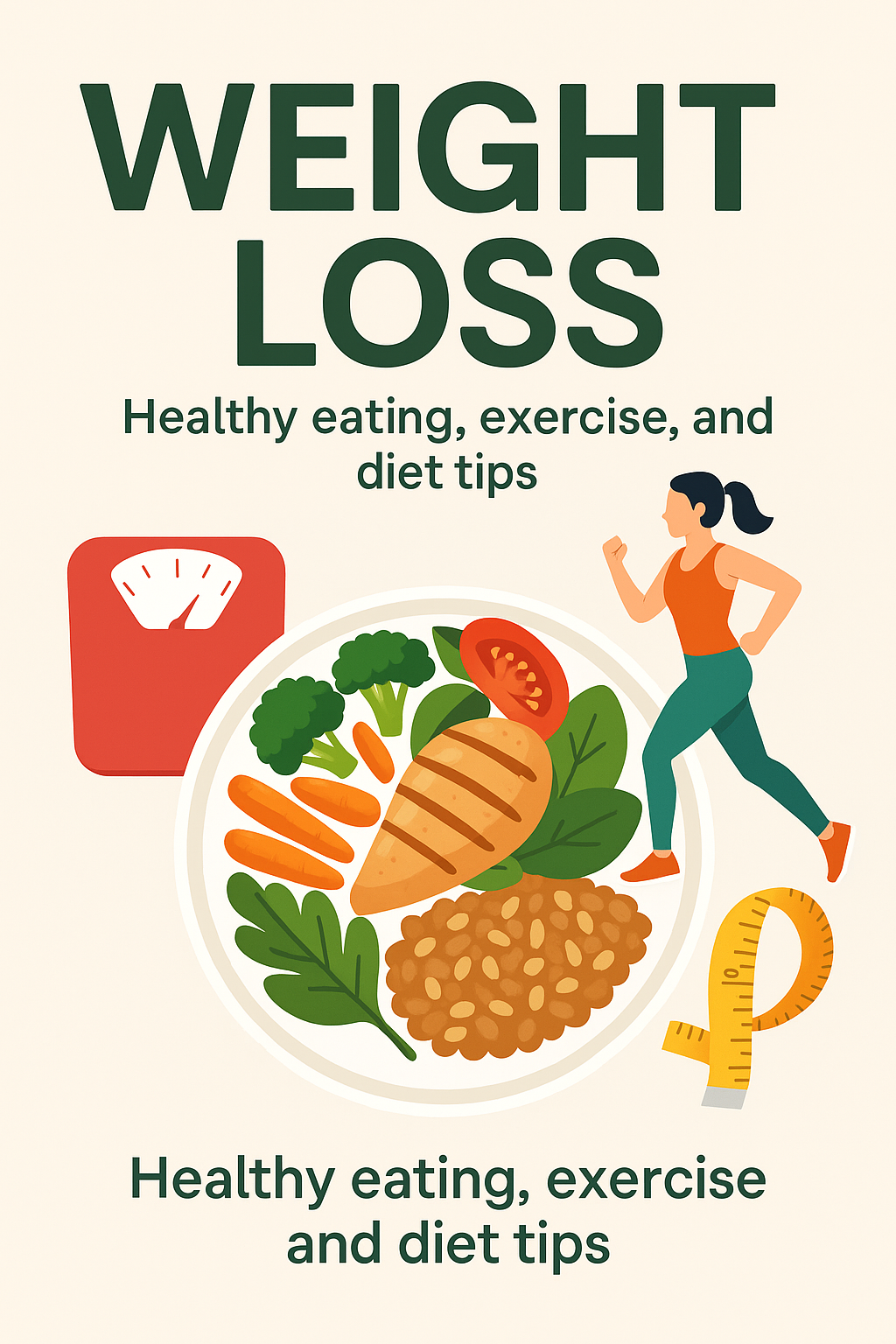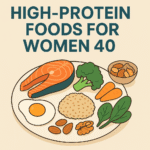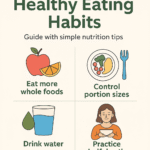Hormones are chemical messengers that control nearly every process in your body—from metabolism and energy to mood, sleep, fertility, and weight management. When your hormones are balanced, you feel energized, focused, and healthy. But when they are disrupted, you may struggle with fatigue, bloating, irregular periods, mood swings, stubborn weight gain, or sleep problems.
One of the biggest culprits behind hormone imbalance is diet. Certain foods that disrupt hormones can throw off your natural balance, overstimulate some hormones, or block others from functioning properly. Understanding these foods is the first step to protecting your hormonal health.
In this article, we’ll cover the top foods that disrupt hormones, how they affect your body, and what healthier swaps you can make for long-term balance.
https://empowerfitusa.com/hormone-checklist-for-women-40-plus/
Why Diet Matters for Hormone Balance
The body’s endocrine system produces hormones that regulate everything from blood sugar to reproductive health. But the wrong foods can:
-
Spike cortisol (the stress hormone)
-
Disrupt estrogen and progesterone levels
-
Lower testosterone (important for women too)
-
Interfere with thyroid function
-
Promote insulin resistance
When you regularly eat foods that disrupt hormones, you create an internal environment that makes it difficult for your body to regulate weight, energy, and mood.

1. Processed Foods and Refined Sugar
At the top of the list of foods that disrupt hormones are refined sugars and ultra-processed foods. These spike blood sugar and cause insulin surges, eventually leading to insulin resistance. This not only increases the risk of diabetes but also interferes with reproductive hormones like estrogen and progesterone.
Examples include:
-
Candy, pastries, cakes, and cookies
-
Sugary drinks like soda and energy drinks
-
White bread, pasta, and bagels
Better choices: Whole grains, fruits, and natural sweeteners like raw honey or stevia.
2. Conventional Dairy Products
Dairy can be one of the most problematic foods that disrupt hormones, especially when it comes from cows treated with synthetic growth hormones or antibiotics. Milk and cheese can contain residues of estrogen and progesterone, which may raise estrogen levels in women and cause imbalances.
Excess estrogen is linked to PMS, weight gain, and a higher risk of certain hormone-related conditions.
Better choices: Organic, hormone-free dairy or plant-based alternatives like almond milk or coconut yogurt.
3. Soy Products (Highly Processed)
Soy contains phytoestrogens, plant compounds that mimic estrogen in the body. While small amounts of organic soy may be safe, excessive consumption—especially of processed soy (soy protein isolate, soy oil, soy-based snacks)—is one of the foods that disrupt hormones by overstimulating estrogen receptors.
This can cause irregular menstrual cycles, bloating, and even thyroid disruption in sensitive women.
Better choices: Organic, fermented soy like tempeh or miso, eaten in moderation.
4. Alcohol
Alcohol is a common but overlooked hormone disruptor. It affects the liver, which is responsible for metabolizing hormones like estrogen. Too much alcohol can cause estrogen dominance, lower progesterone, and even reduce testosterone in women.
It also raises cortisol levels, which can lead to poor sleep and weight gain around the belly.
Better choices: Herbal teas, sparkling water with lemon, or kombucha (in moderation).
5. Caffeine in Excess
A cup of coffee is fine for most people, but too much caffeine raises cortisol, the stress hormone. High cortisol disrupts progesterone, estrogen, and thyroid balance. If you’re struggling with fatigue, anxiety, or poor sleep, caffeine overload may be one of the hidden foods that disrupt hormones.
Better choices: Green tea, matcha, or caffeine-free herbal teas.
6. Refined Vegetable Oils
Many packaged foods contain refined oils like soybean, corn, canola, and sunflower oil. These are high in omega-6 fatty acids, which promote inflammation. Chronic inflammation can interfere with insulin sensitivity and sex hormone balance.
Better choices: Extra virgin olive oil, avocado oil, or coconut oil.
7. Red Meat from Factory Farms
Conventional red meat is often loaded with growth hormones and antibiotics. Eating it regularly makes it one of the foods that disrupt hormones, as it contributes to excess estrogen and inflammation.
Better choices: Grass-fed beef, organic poultry, or plant-based protein sources like beans and lentils.
8. Artificial Sweeteners
Many “diet” foods and drinks use artificial sweeteners like aspartame, sucralose, and saccharin. These may interfere with insulin and gut microbiome balance. A disrupted gut can affect estrogen detoxification, making sweeteners hidden foods that disrupt hormones.
Better choices: Stevia, monk fruit, or raw honey.
9. Packaged Snacks and Fast Foods
Chips, fries, frozen pizzas, and burgers may taste good, but they are loaded with trans fats, refined carbs, and chemical preservatives. These foods spike inflammation and insulin while disrupting estrogen and progesterone balance.
Better choices: Homemade baked snacks, nuts, seeds, and fresh fruits.
10. Gluten (in Sensitive Individuals)
Gluten doesn’t affect everyone, but in sensitive women, it may trigger autoimmune reactions that impact the thyroid gland. Since thyroid hormones regulate metabolism, gluten can be one of the foods that disrupt hormones in those with thyroid issues.
Better choices: Gluten-free grains like quinoa, brown rice, and oats.
Tips to Restore Hormone Balance
Avoiding foods that disrupt hormones is the first step, but adding hormone-friendly foods helps too.
Best foods for hormone balance:
-
Cruciferous vegetables (broccoli, kale, cauliflower) to detox estrogen
-
Omega-3 rich foods (salmon, chia seeds, walnuts)
-
High-fiber foods (flaxseed, lentils, apples)
-
Fermented foods (sauerkraut, kimchi, kefir) for gut health
-
Hydrating foods (cucumber, watermelon, leafy greens)
Lifestyle choices like managing stress, sleeping well, and exercising regularly also play a big role in maintaining hormone health.
Final Thoughts
Your hormones affect everything from weight and energy to mood and reproductive health. The wrong foods can easily disrupt this delicate system. By cutting out foods that disrupt hormones—like processed sugar, conventional dairy, alcohol, refined oils, and artificial sweeteners—you can protect your body’s natural rhythm.
Replacing them with nutrient-dense, whole foods helps restore balance, improve energy, and support long-term wellness.
If you’ve been struggling with weight gain, fatigue, or irregular cycles, start by looking at your diet. Your hormones may thank you.




